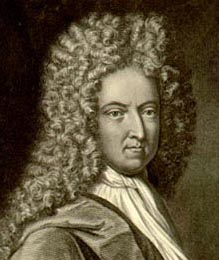|
Writer, Traveller, Dissenter

Daniel Defoe, the son of a butcher, was born in London in 1660. He attended Morton's Academy, a school for Dissenters
at Newington Green with the intention of becoming a minister, but he changed his mind and became a hosiery merchant instead.
In 1688 Defoe
took part in the Monmouth Rebellion and joined William III and his advancing
army. Defoe became popular with the king after the publication of his poem, The
True Born Englishman (1701). The poem attacked those
who were prejudiced against having a king of foreign birth.
The publication of Defoe's The Shortest Way with the Dissenters (1702) upset a large number of powerful people. In the pamphlet, Defoe, a Dissenter, ironically demanded the savage suppression of dissent. The pamphlet was judged to be critical of the Anglican Church and Defoe was fined, put in the Charing Cross Pillory and then sent to Newgate
Prison.
In 1703 Robert
Harley, Earl of Oxford, a Tory government official, employed Defoe as a spy.
With the support of the government, Defoe started the newspaper, The Review. Published between 1704 and 1713, the newspaper appeared three times a week. As well
as carrying commercial advertising The Review reported on political and social issues. Defoe also wrote several pamphlets for Harley attacking the
political opposition. The Whigs took Defoe court and this resulted in him serving another prison sentence.
In 1719
Defoe turned to writing fiction. His novels include: Robinson Crusoe (1719), Captain Singleton (1720), Journal of the Plague Year (1722), Captain Jack (1722), Moll Flanders (1722) and Roxanda (1724).
Defoe also wrote a three volume travel book, Tour Through the Whole Island of Great Britain
(1724-27) that provided a vivid first-hand account of the state of the country. Other non-fiction books include The Complete English Tradesman
(1726) and London the
Most Flourishing City in the Universe (1728). Defoe published over 560
books and pamphlets and is considered to be the founder of British journalism. Daniel
Defoe died in 1731.
|
 |
|
A Journal of the Plague Year
an account of the
Great Plague of London(1664-65)
first published in 1722. Defoe
describes the horrifying daily
events in London city as it was
besieged by bubonic plague.
A Tour through England
and Wales
divided into circuits
or journeys (vol. 1)
A Tour through England
and Wales
divided into circuits or
journeys (vol. 2)
Robinson Crusoe (1719)
the Further Adventures of Robinson Crusoe
(1719)
| |
|
related internet links
|
|
a market town in
Shropshire
visited by Defoe on
his tour through
England and Wales
one of those books, along with a Bible,
Foxe's Book of Martyrs and
the Pilgrim's Progress, most likely
to be found in any English home
between 1750 and 1850. Children
were encouraged to read it because
it was believed to inculcate
principles of right living.
Defoe was incarcerated in
Newgate Prison for a time
online edition of the largest body of
texts detailing the lives of non-elite
people ever published, containing
accounts of over 100,000 criminal trials
held at London's central criminal court.
|
|
 |
|
|
 |
|
|
|

